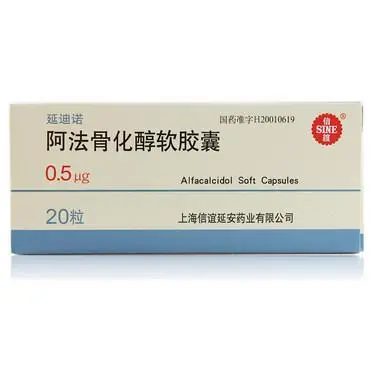Alfacalcidol Soft Capsules
Function:
Alfacalcidol is a calcium-regulating drug that can be converted into 1,25-dihydroxyvitamin D`-3` in the liver, which is a metabolite of vitamin D`-3` and has the ability to regulate calcium and phosphate metabolism. role. This product can increase the level of 1,25-dihydroxyvitamin D`-3` in the blood circulation in the body, thereby increasing the intestinal absorption of calcium and phosphate, promoting bone mineralization, reducing plasma parathyroid hormone levels, and reducing bone calcium dissolution , relieve bone and muscle pain and improve osteoporosis caused by intestinal calcium absorption disorders caused by menopause, aging, and endocrine changes.
Dosage:
Oral administration for chronic renal insufficiency and osteoporosis, adults 0.5-1μg each time (0.25μg per tablet, 2-4 tablets), once a day, the dosage should be increased or decreased appropriately according to age and disease symptoms, please follow your doctor’s advice for details . Hypoparathyroidism and other diseases with abnormal vitamin D metabolism are administered orally. Adults take 1-4 μg each time (0.25 μg per tablet, 4-16 tablets), once a day. The dosage should be increased or decreased appropriately according to age and disease symptoms. Please follow your doctor’s advice for details. Pediatric dosage: For osteoporosis in children: the usual dosage is oral alfacalcidol 0.01-0.03μg/kg once a day; for other diseases with abnormal vitamin D metabolism, oral alfacalcidol once a day Phytol 0.05-0.1μg/kg, the dose should be increased or decreased appropriately according to age and disease symptoms. Medication for children must be carried out under the guidance of a doctor and adult supervision. Dosing Method In order to prevent the occurrence of hypercalcemia, the dose of alfacalcidol should be adjusted according to the biochemical test results. Efficacy indicators include: serum calcium, alkaline phosphatase, parathyroid hormone, urinary calcium excretion and effects, and histological examination. Blood calcium levels must be measured weekly during the initial period of medication, and once the dose is stable, blood calcium levels must be measured every 2-4 weeks. For patients with osteomalacia, the dosage of alfacalcidol cannot be increased because their blood calcium levels do not rise rapidly; other efficacy indicators, such as plasma alkaline phosphatase levels, can be used as more useful indicators for adjusting the dose. Please consult your doctor for details.
Drug contraindications:
If you are allergic to this product, use with caution if you have liver or kidney dysfunction.
Related dosage forms:
capsules, tablets
Share:
Products
Our offers
Health Classification
Let us work together to protect precious health
































